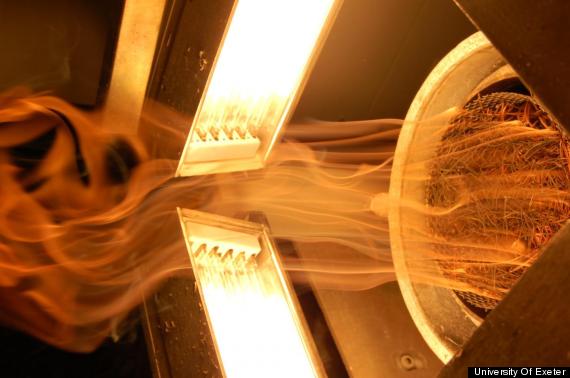
Scientists have long believed that an asteroid impact in what is now Mexico wiped out 80 percent of all species on Earth--including the dinosaurs--about 65 million years ago.
But exactly what happened when that cataclysmic collision occurred, and why did it lead to the mass extinction? Those questions have been part of a complicated puzzle for scientists to piece together.
Previous research suggested that the asteroid triggered earthquakes, shock waves, intense heat, and choking clouds of dust that blocked out the sun and caused temperatures to plummet. In 2013, researchers hypothesized that the asteroid also sparked a global firestorm that played a role in causing the mass extinction.
Now a team of scientists in the U.K. have poked a big hole in the firestorm theory after conducting a series of simulations.
The scientists used a fire propagation apparatus to create pulses of heat using powerful halogen lamps. They exposed plant materials to pulses of different intensities and durations to simulate the effects of the impact both near the impact site and far away--and watched to see whether they ignited.
(Story continues below image).
The apparatus used to simulate the pulse of heat caused by the asteroid impact.
What happened? Brief but very intense pulses, which simulated the heat near the apparent impact site, were too short to set the plant on fire. Paradoxically, plants that were exposed to less intense but longer pulses, which represented heat that propagated through the atmosphere to places thousands of miles away, did catch fire.
"This has shown us that the heat was more likely to severely affect ecosystems a long distance away, such that forests in New Zealand would have had more chance of suffering major wildfires than forests in North America that were close to the impact," lead researcher Dr. Claire Belcher, a senior lecturer in Earth System Science at the University of Exeter, told The Huffington Post in an email.
While local wildfires would have caused damage, it's unlikely they would have been able to spread to spark a firestorm around the globe--the oceans would have checked their spread, she said.
"So the work highlights that we do need to reconsider the record of survival and extinction because we know that the heat pulse was potentially more harmful further away," Belcher said in the email, "but also that the heat and any local fires are just part of the extinction puzzle and that likely it was a chain of events that were so deadly and not high heat alone."
The research was published online Jan. 22 in the Journal of the Geological Society.
